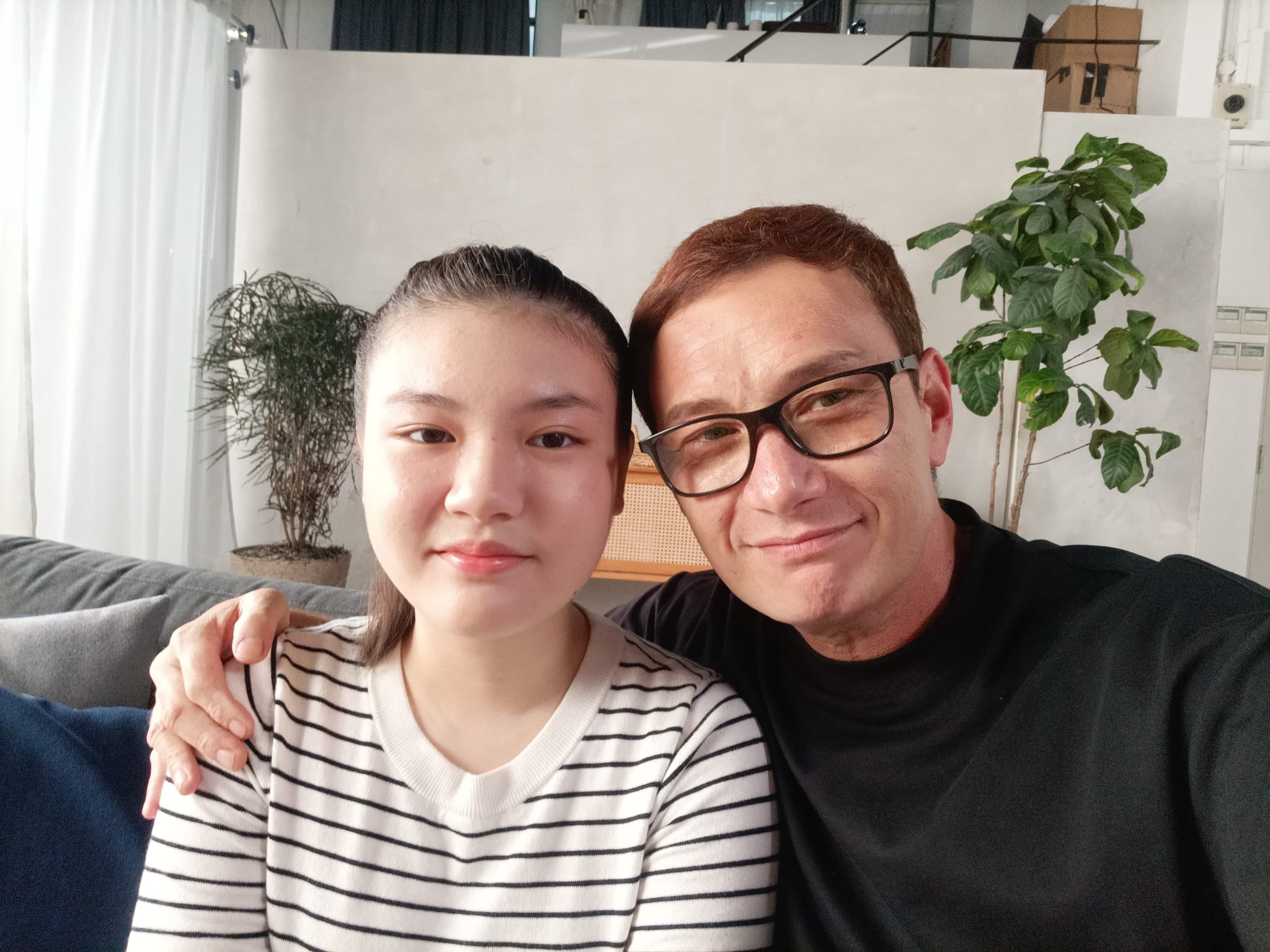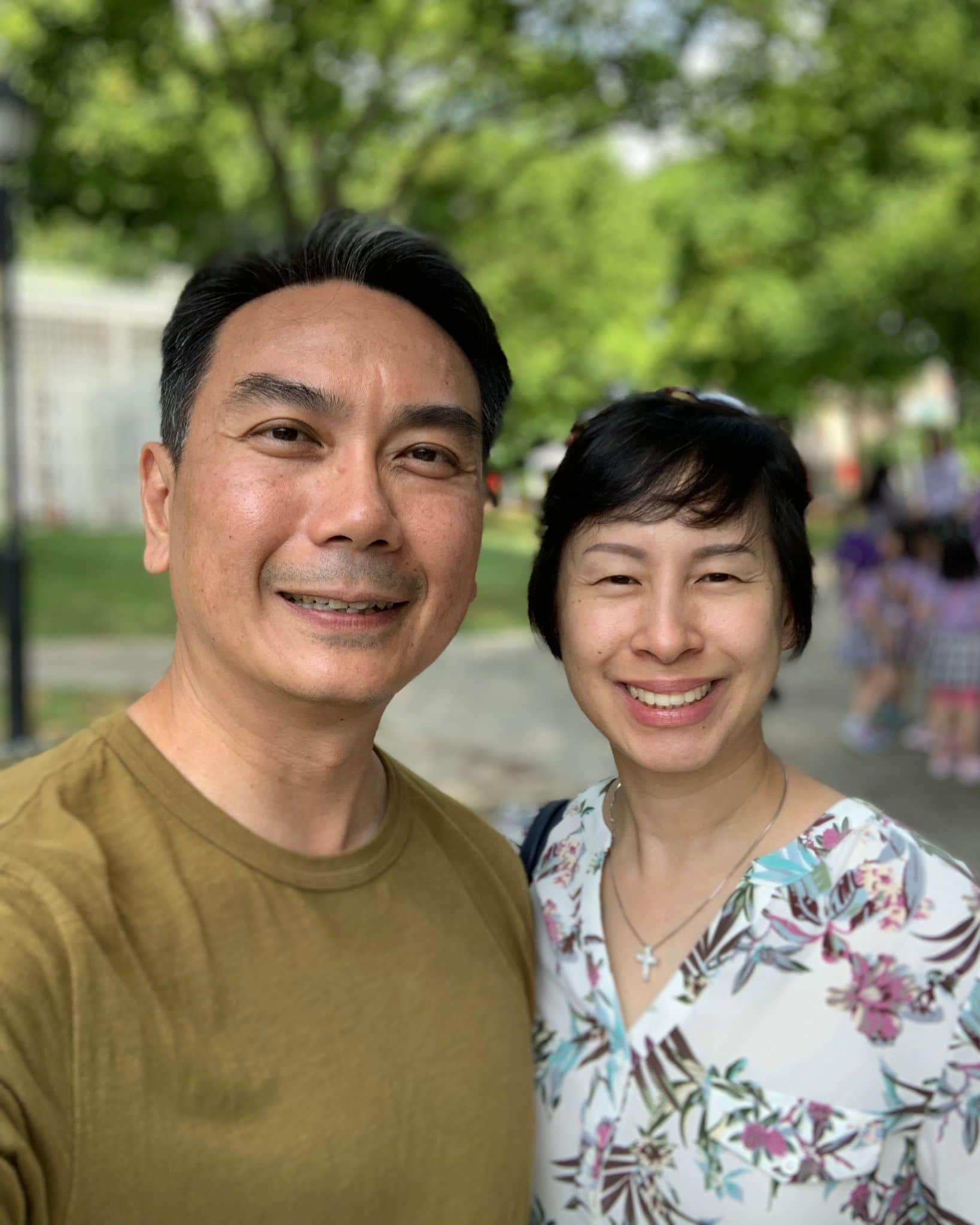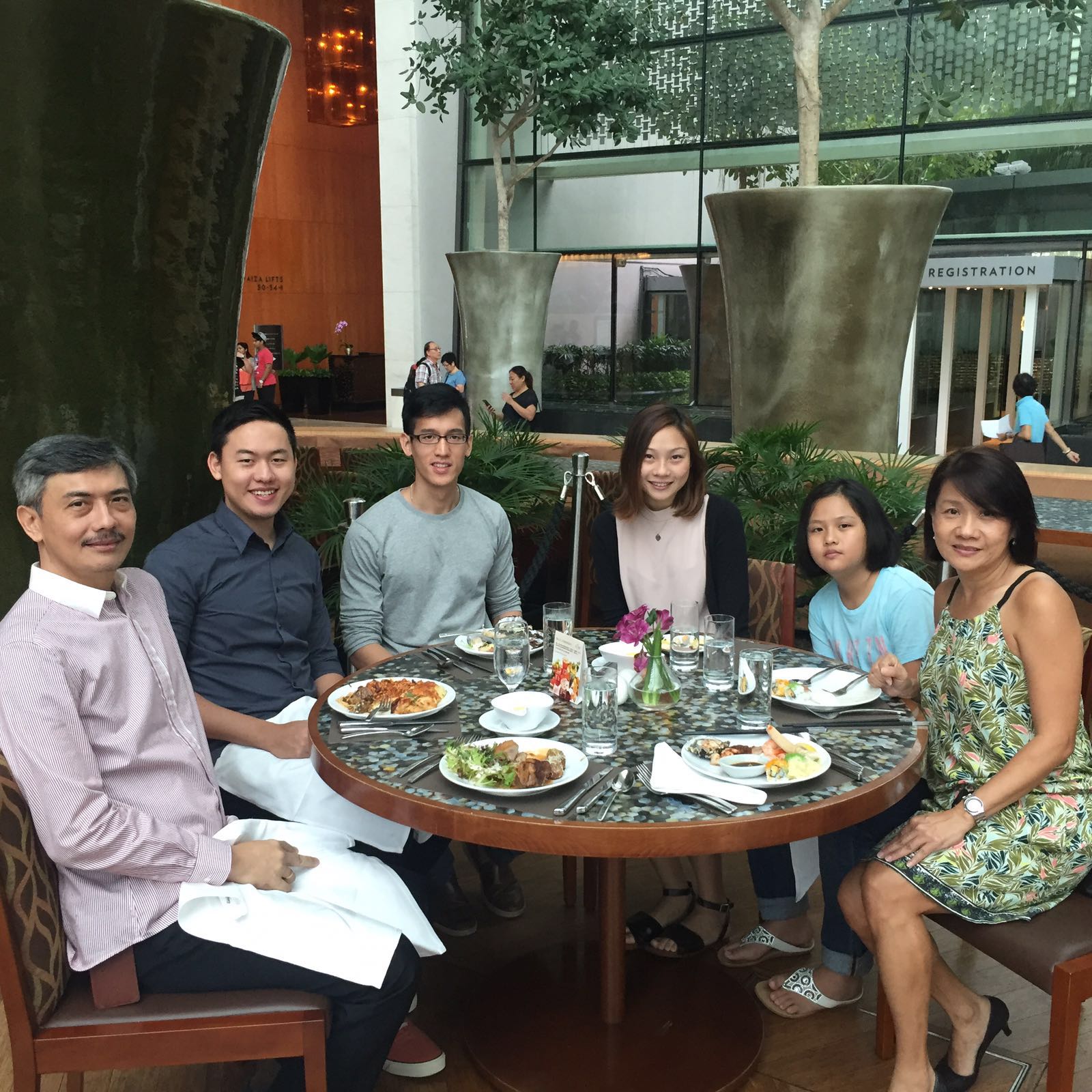Are we giving dads the support they need to be better fathers?: Salt&Light Family Night
by Christine Leow // March 31, 2022, 4:37 pm

Bruce Mathieu and his daughter. His love for her motivated him to change for the better. Photo courtesy of Bruce Mathieu.
“If my father had been around, things would have been very different.”
More than five decades after his father walked out on him and his mother, Bruce Mathieu still laments the loss.
His mother, left alone to raise Bruce who was about a year old then, moved back to live with her family. She had 10 siblings and their big house in Katong was always “filled with people”.
“There wasn’t a father around to protect me, to watch over me. I got bullied all the time.”
But it was not filled with love.
“There wasn’t a father around to protect me, to watch over me. I got bullied all the time.
“A couple of my mother’s brothers were drunks. When they came home after work, after a night of drinking, I would always get it from them. I got beaten up very often.
“I got blamed for things that I didn’t do, got accused of stuff even when I didn’t know what it was all about. Growing up in that sort of environment taught me that violence could settle everything.”
As a teenager, Bruce was “a violent person” who would get into “full-blown gang fights” an average of nine times a week.
“I was a very angry child.”
The father you aspire to be
Now a father of a tween daughter, Bruce is “older and hopefully wiser”. Five prison sentences and the fear that his daughter would grow up fatherless if he continued his wild ways helped him mature both as a man and a father.
Bruce was on the panel of Salt&Light Family Night (March 29) discussing the topic: From the father I am to the father I want to be.
Fathers (61%) and mothers (25%) logged in to Salt&Light Family Night to find out how to be the kind of father they desire to be.
Also on the panel were husband and wife, Dr Frankie and Tina Tan. The Tans have three sons aged 19, 18 and 13. Passionate supporters of families on various platforms in the community, Frankie has been active with Dads for Life since its inception. He also facilitates a group with men in various life stages and does individual mentoring. Together, they conduct couple and individual coaching with a special focus on ADHD as well.
Completing the panel was Parcsen Loke, a husband, father of three and grandfather of one with another on the way. He oversees the programmes at Centre for Fathering and is a relationship coach as well as the author of The Modern-Day Dad.
Some 170 viewers – fathers made up 61% and mothers 25% – logged in to Salt&Light Family Night to find out how to be the kind of father they desire to be. A third of the parents had teens (aged 11 to 20) while another third were new parents with children four and younger. Those with children aged between five and 10 made up about 20%.
Dads are as important as mums
Growing up without a father affected Bruce “big time” even though he tried not to think about it.
“It sure made me a very undesirable person to be with.”
A friend from his youth he reconnected with two years ago confessed that Bruce was one of two people in the whole of Singapore whom he “avoided like the plague”.
“Both parents play a vital role in a child’s upbringing.”
“He told me, ‘You were an unpredictable person, smiling one minute and the next you are bashing someone up.’
“Getting myself into fights, hurting someone, was the norm (for me). I didn’t feel bad. I didn’t feel I was doing anything wrong.
“Does that have anything to do with my father not being around? Of course it did.”
Because Bruce’s father left the family, his mother had to work all the time to support him. As a child, he was “left to my own devices”.
“Every day after school, I came back to a big empty house. I would hide in my room because I was always bullied. I always asked myself, ‘Why did all this happen to me?’
“Unlike all these children you see them going out, there is always a father and a mother. I was different. It made me feel that unlike my peers, I considered myself very abnormal.”
Tina agreed on the importance of fathers.

Dr Frankie Tan and his wife Tina believe in supporting one another in the parenting journey. Photo courtesy of the Tans.
“It is really God’s biblical design. It is not a singular authority in the home.
“Both the father and mother can bring different types of wisdom, different types of strengths. Their personalities complementing one another can bring a sense of security to the home.”
Many mothers tend to be nurturers, Tina added.
“Fathers’ and mother’s personalities can complement one another, bringing that sense of security to the home.”
They likely look out for the safety, protection, health and nutrition of their children.
Fathers tend to emphasise resilience, sportsmanship, the outdoors and play.
“They don’t even mind allowing some risks. They are often the ones who throw the baby up in the air because they know they have the strength to catch the baby.”
The different approaches to parenting work in tandem to give children a holistic upbringing.
Added Bruce: “I would like to encourage all the fathers out there, take your role seriously. A child growing up without a father is lacking something.”
Lessons from archery
Fathers’ support groups, where fathers can meet to be encouraged, is one way men can find support in their parenting journey.
Dr Tan started one such group in his sons’ primary school under the banner of Dads for Life.
“Be aware of your child’s strengths and weaknesses and find ways to be encouraging and affirming.”
“We create programmes and events for fathers and their children to bond, and to inspire and equip them to be a positive influence in their children’s lives.
“In the earlier years, I would participate with my boys and facilitate the events and programmes at the same time. It’s been an inspiring experience throughout.
“I’ve learnt and received so much even as I reached out and shared. I feel so blessed to have met so many dads and their children in our community and to have learnt their stories.”
Though his sons have long left primary school, Dr Tan still meets up with some of the dads who continue to “cheer each other on”.
Many of the activities for dads and their kids include important learning points. Dr Tan cited an archery workshop in which lessons about targets and aims were woven in.
“Your opportunity to build a relationship with your child is critical in childhood.”
“There are four simple teaching points: One, choose your target. What are you aiming for and what do you want your child to aim for? If you don’t pick a target, your children may not have an idea of where you are heading.
“Two, take aim. If you don’t aim, you will never hit the mark. Decide what you are going to start aiming at in your own life and direct your child in the same direction. It’s important to make intentional effort to do so. Knowing is not enough.
“Three, improve your aim. Equip yourself like you do in your workplace. Get expert advice, prioritise and practise. Be aware of your child’s strengths and weaknesses, and find ways to be encouraging and affirming.
“Finally, keep shooting. Just like a sharp shooter practises and keeps getting better, fatherhood is a commitment to your child for life.”
Another activity is go-kart racing where fathers are reminded that, much like racing, life speeds by.
“Your role as a father will change over the seasons but your opportunity to build a relationship with your children is critical in their childhood.
“If you don’t practise and prioritise now, this stage passes by very fast and you can’t turn back time,” said Dr Tan.
Playing up the partnership of parenting
Mothers can give fathers the space to step in and step up.
Said Tina: “God has blessed many of us mothers with a lot of talents to manage the household, manage the children. And sometimes, we don’t tend to bring the husbands in.”
“Allow your husbands to succeed because when they succeed, the family also succeeds. We enjoy the family more.”
This is especially true when the child is in primary school. Mothers tend to be the ones supervising the homework and engaging the teachers. Fathers then “fade away”.
Tina encouraged mothers to let their husbands “take the lead”.
“Allow them to succeed because when they succeed, the family also succeeds. We enjoy the family more.
“They are engaged, they are caring for and loving the children, which is something that mothers want.”
She admitted that this advice “needs to come from a mother” and so this is what she does as chairperson of the parent support group in her sons’ primary school.
One signature event she always tells mothers to encourage their husbands to attend is the annual Primary One March school holiday father-child sleepover. Fathers get to talk about the school day with their children, go on a treasure hunt and read a book of their children’s choice to them before bedtime.
“Being a team that loves one another will allow the family to be a model in that design that God intended.”
Tina said such activities are designed to allow fathers to spend extended time with their children and be more involved in their needs.
Said Tina: “I tell the mothers to let their husbands come and supervise the child’s eating, the brushing teeth, the bathing and the playing. And they will actually learn so much about the child that you want them to learn.’”
Parenting is a partnership, Tina reminded viewers.
“Being a team that loves one another, that has different strengths that you can leverage, is something that will allow the family to be a model in that design that God intended.”
What if wives are openly critical?
When wives are critical of husbands in front of the children, Tina encouraged dads to “be humble to listen to the truth in it”.
Although the situation can understandably incense the husband and damage family relationships, “there can be truth in what the woman is saying, even if she says it in a mean way,” pointed out Tina.
“Women are very sensitive to authenticity.”
“When you take a step of willingness to learn even from the harsh kind of approach that your wife has taken, I believe most women will tone down.
“It is a chance for you both to settle things openly, for you to say, ‘What can I do better?’ It is also a chance for you to have your wife understand where you are coming from.”
She encouraged husband to have “heart-to-heart talks” with their wives to find out how their wives would like them to respond in the situation, and reminded husbands that it may take more than one conversation to resolve matters.
“Don’t let the matter fester. Don’t let it keep eating into you without dealing with it because then it will happen more and more in front of the children.
“When you take a step of wiliness to learn, I believe most women will tone down.”
“And you will one day blow up and you will look like the bad guy.”
Tina also encouraged husbands to be sincere in wanting genuine change rather than wanting to “solve the problem and save your pride”.
“Women are very sensitive to authenticity,” she reminded.
To the wives, Tina cautioned: “Women have a weapon that we sometimes use and it is very subtle: The tongue. We use words to attack our husbands and that is really under the belt. No one can report to the police about this kind of abuse but it is very lethal.”
How husbands can support new mums
Parcsen, who has experience talking to new fathers in his work at the Centre for Fathering, encouraged new dads to take their two weeks of paternity leave in full.

Parcsen Loke (left) with his family. His work with the Centre for Fathering has given him many opportunities to journey with fathers.
“Try not to save any for later. It will give you a jump-start to your fathering journey.”
“One thing that many people do not realise is that postpartum depression can be experienced both by mums and dads.”
The little things done in those early weeks of the baby’s life – bathing, changing, looking into the baby’s eyes and making funny faces – help fathers bond with their children “like no other ways can”.
Being present in those weeks also provides moral and emotional support to the new mums as well as allows time for fathers to take stock of their own emotional state.
“One thing that many people do not realise is that postpartum depression can be experienced both by mums and dads, but dads’ depression is under-reported,” said Parcsen.
He told the fathers to set aside time – five to 15 minutes once a week – to take stock of their feelings and that of their wives.
Couples need to keep an eye on their children as well as each other in the parenting journey.
“Be honest with each other and be very open.
“Ask, ‘How can I better support you?’”
Articulating expectations is important because while unresolved expectations in a marriage can be dangerous, unspoken expectations are worse, noted Parcsen.
Likening the situation to beach volleyball, he said that, in the game, both players need to keep an eye on the ball as well as on each other.
In the same way, couples need to keep an eye on their children as well as each other in the parenting journey.
What about those who are fatherless?
What would help those without a father is having a father figure in their lives, “someone from whom they can seek advice”, said Bruce, who regularly meets such youths in his ministry. He often shares his testimony with them.
“They may have many questions about life that are unanswered. Many times, they cannot ask their mothers because it may be easier for a man to talk to another man.”
He encouraged men who have stability in their lives to be role models to youth rather than have them “looking to their friends who may lead them down the wrong path”.
“Show them what being humble, being teachable, is. I think that is a very valuable, priceless characteristic to have.”
The commitment should be a long-term one, though.
“These are people’s lives we are talking about. When they have a bond with you and you disappear, that will break the person’s heart,” added Bruce.
Tina and Parcsen suggested looking for mentoring opportunities at community services, university mentor schemes and grassroots bodies such as Residents’ Committees.
Go with a “teachable heart”, said Parcsen.
“Don’t forget there is a generational gap, which may be wider than you anticipate.
“Model to the younger people what it is like to be teachable. Some may lean towards arrogance because the Internet fools them into thinking they know everything.
“Show them what being humble, being teachable, is. I think that is a very valuable, priceless characteristic to have.”
How do I help my child who is being bullied?
Bruce shared how he witnessed his daughter being bullied when she was just three. An older child was pushing his way around at the playground and was trying to hit his daughter.
“I saw my daughter stand her ground. She kept saying, ‘No, no, no, no, no, no!”
“Make sure your children know that the most important people in their life are on their side.”
When she was cornered, she held on to the boy’s hands and repeatedly said “no” before pushing his hands away and walking away from the situation.
“I chose not to interfere because I saw that she could handle the situation and she could learn from it rather than being sheltered.”
But not all children are able to walk away unscathed from being bullied.
Parcsen advised parents to “first find out how the child feels” about the situation and to empathise with the child, so he or she knows that “the most important people in my life are on my side”.
“Then, you can teach empathy. The majority of people who bully may seem bold but they may have very fragile self esteem. That’s often why they have to resort to bullying to get themselves on a higher level.
“That’s something children can learn – that the one being bullied can be the stronger one. Help the child to understand what is really happening from the perspective of the bully.”
After this, parents can “go into problem-solving mode” and give tips on how to avoid or face up to the bully.
“That’s something children can learn – that the one being bullied can be the stronger one.”
“Problem-solving is the easier part. The empathy part is something we often skip over.”
With older children, Dr Tan talked about empowering the child to be able to speak up and defend his position because he may be encountering the bullying more than once.
Finally, Tina reminded parents to entrust their children to God. She shared that she only found out her son had been bullied long after the fact because he has special needs and did not immediately communicate with her about the situation.
“We can’t be there but God is there,” she said.
“Allow this opportunity to be the time to highlight the importance of their own relationship with Father God so that they will know that their spiritual faith is bigger than whatever that they will face physically.”
This report is Part 1 of the Salt&Light Family Night episode on From the father I am to the father I want to be. Look out for Part 2 of the report next week.
A full recording of this episode will be available next week. You can watch past episodes of Salt&Light Family Night on our YouTube channel here.
RELATED STORIES:
Smoking by 8, wanted in Singapore by 25: This “no hope” prisoner is now a pastor
He tried to run away, but God taught this ultra-marathoner to run from depression instead
We are an independent, non-profit organisation that relies on the generosity of our readers, such as yourself, to continue serving the kingdom. Every dollar donated goes directly back into our editorial coverage.
Would you consider partnering with us in our kingdom work by supporting us financially, either as a one-off donation, or a recurring pledge?
Support Salt&Light


